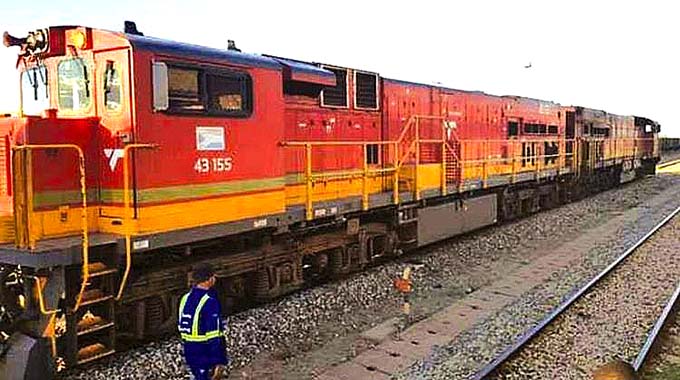Sleaze bleeds NRZ $22m yearly
THE National Railways of Zimbabwe (NRZ) may have lost millions of dollars in unrealised potential revenue, over many years, through widespread acts of corporate malfeasance and sleaze perpetrated by corrupt officials who took advantage of weak governance, monitoring and control systems at the parastatal.
NRZ said this week it had instituted a restructuring exercise across its operations, including measures aimed at rooting out the suspected acts of corruption in the organization’s real estate division, which may have cost the state company at least $22 million annually over an unspecified number of years.
The strategically important railway company, critical for cost-effective transportation of bulky and heavy freight across the country and beyond, has over the years struggled to provide efficient and reliable services due to undercapitalisation and mismanagement as well as outdated equipment and systems.
According to the auditor general’s 2019 report on parastatals and state enterprises, NRZ is technically insolvent with total current liabilities exceeding current assets.
The company has been incurring substantial losses over the last 10 years. Operating loss (loss before finance, monetary gains and taxation) for 2019 stood at $1,079 billion.
The Government has been working though to breathe new lease of life into the company by seeking investors to inject fresh capital, although such efforts fell through recently when the Diaspora Investment Group (DIDG) could not demonstrate proof of funding as earlier agreed.
As a result, in 2019 the Government terminated the US$400 million NRZ recapitalisation agreement it had entered into with DIDG in 2017, which saw DIDG file a US$255 million lawsuit.
Reports indicate, however, that Yapi Merkezi, the Turkish company which recently signed a Memorandum of Understanding with NRZ to recapitalise and modernise the firm’s railway system, has started implementing phase one of the deal, which entails assessing its rail infrastructure across the country.
Officials at NRZ say following the restructuring at the rail operator’s real estate division, the unit’s revenue improved by 100 percent, although the company kept its silence on whether any punitive action had been taken against the managers suspected to be responsible for allegedly haemorrhaging the parastatal.
Notably, the restructuring of operations at NRZ followed a directive from the Government for the state rail operator to realign its operations to business demand, which saw the company reducing the number of directors from five to three. Overall, the company says the reorganisation would enhance efficiency.
Upon discovering the rot in the real estate department, which entailed the unsanctioned sub-letting of the company’s premises, assets and land; especially in the eastern region of Harare where the operation is headquartered, NRZ said it had reassigned the entire real estate portfolio management to area managers.
Acting general manager Respina Zinyanduko said the real estate department had been redesigned to address several allegations of corruption and malpractice that had built over years.
“The real estate business portfolio, which is responsible for overseeing NRZ real estate assets that include commercial land and farms, office accommodation, residential houses (employees and private tenants), and commercial developments at stations and sidings and joint venture developments on railway reserves.
“Worth noting is that the real estate department has been rocked by a number of corruption cases and was losing approximately $22 million annually to space barons who were leasing properties and premises throughout the country,” the company said.
The beleaguered state rail company indicated it was now in the process of standardising all lease agreements and zoning its land while ensuring application of uniform lease fees for each area.
“A robust lease approval system that has checks and balances was developed to ensure transparency. Compilation of the asset register is ongoing and NRZ is in the process of recovering some of its land that had been illegally occupied and in some instances transferred,” Zinyanduko said.
It has emerged the company also had to overhaul the procurement department, which was mainly manned by underqualified staff while also blighted by several allegations of malpractices.
The audit division reportedly unearthed cases that were not properly handled, which enabled the company to recover value from errant suppliers.
“Ensuring that NRZ gets value for money for every item purchased will be the ultimate goal of management. Accountability and transparency are key in the success of every organisation and NRZ is no exception,” Zinyanduko said.
Another of the departments, NRZ said, that have been restructured is the works department, which comprised 100 employees in different grades; among them managers, artisans, assistants and manual workers. The workers spent most of their time idle due to lack of resources and use of contractors in undertaking repairs to buildings and
maintenance.
Most of the employees have since been reassigned to other areas of need where the organisation would benefit. The division is now left with just 20 people responsible for doing minor repairs and maintenance works. Zinyanduko said the organisation had a wing in the department, which was responsible for borehole drilling and maintenance.
The company said it had since acquired equipment for borehole drilling, as it requires 80 boreholes given erratic water supply.
The equipment would also be used for commercial contracts. Some of the staff in the department, who have the expertise, will be redeployed to the company’s Nalatale Mine where NR intends to produce ballast stones for its mainline.
The application of the ballast stones was last done 15 years ago, which explains why most of NRZ’s tracks are in a poor state and cannot be sustained using ballast stones from commercial suppliers. NRZ said all the staff transfers were done on a later transfer basis.-eBusiness Weekly










